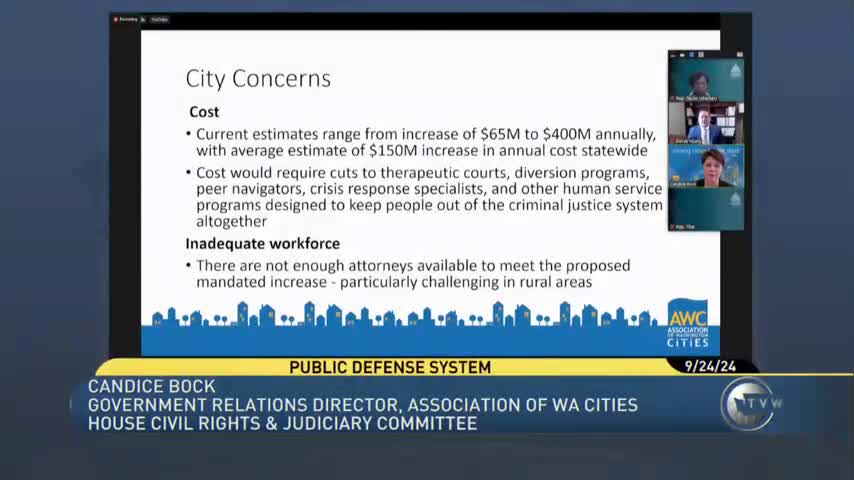Public defense crisis threatens justice system integrity
September 24, 2024 | Civil Rights & Judiciary, House of Representatives, Legislative Sessions, Washington
This article was created by AI summarizing key points discussed. AI makes mistakes, so for full details and context, please refer to the video of the full meeting. Please report any errors so we can fix them. Report an error »

In a recent government meeting, officials expressed deep concerns regarding the state of public defense and the criminal justice system in Washington. The discussions highlighted the potential impact of proposed budget cuts on essential programs, including therapeutic courts and diversion initiatives designed to prevent individuals from entering the criminal justice system.
Key speakers pointed out that Washington's law schools are not producing enough graduates to meet the growing demand for public defenders. In 2023, only 615 new attorneys graduated, while estimates suggest that the state would need to add 100 attorneys per month for the next 30 months to meet current standards. This shortage is compounded by the fact that not all new attorneys are willing to take on public defense roles, which are often challenging and underfunded.
The meeting also addressed the shifting landscape of criminal cases, noting an increase in misdemeanors as felony cases are pushed into lower courts due to an overwhelmed system. This trend raises concerns about the seriousness of these cases, which include domestic violence and DUI offenses, and the perception of a \"revolving door\" in the justice system that fails to provide accountability for victims.
Participants urged the legislature to conduct more in-depth studies specific to Washington's needs before implementing blanket standards for public defense. They emphasized the importance of partnerships to enhance workforce recruitment and retention, particularly in rural areas, and called for increased funding for public defense programs, which have remained stagnant at around $1 million for over a decade.
The conversation also touched on the complexities of funding and local control, with officials acknowledging that while state investment is crucial, it must be balanced with local management to ensure effective service delivery. The meeting concluded with a commitment to continue discussions on these pressing issues, recognizing the critical need for reform in the public defense system and the broader court structure in Washington.
Key speakers pointed out that Washington's law schools are not producing enough graduates to meet the growing demand for public defenders. In 2023, only 615 new attorneys graduated, while estimates suggest that the state would need to add 100 attorneys per month for the next 30 months to meet current standards. This shortage is compounded by the fact that not all new attorneys are willing to take on public defense roles, which are often challenging and underfunded.
The meeting also addressed the shifting landscape of criminal cases, noting an increase in misdemeanors as felony cases are pushed into lower courts due to an overwhelmed system. This trend raises concerns about the seriousness of these cases, which include domestic violence and DUI offenses, and the perception of a \"revolving door\" in the justice system that fails to provide accountability for victims.
Participants urged the legislature to conduct more in-depth studies specific to Washington's needs before implementing blanket standards for public defense. They emphasized the importance of partnerships to enhance workforce recruitment and retention, particularly in rural areas, and called for increased funding for public defense programs, which have remained stagnant at around $1 million for over a decade.
The conversation also touched on the complexities of funding and local control, with officials acknowledging that while state investment is crucial, it must be balanced with local management to ensure effective service delivery. The meeting concluded with a commitment to continue discussions on these pressing issues, recognizing the critical need for reform in the public defense system and the broader court structure in Washington.
View full meeting
This article is based on a recent meeting—watch the full video and explore the complete transcript for deeper insights into the discussion.
View full meeting
